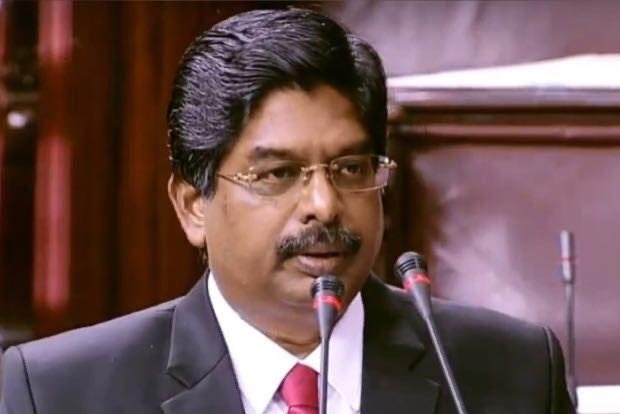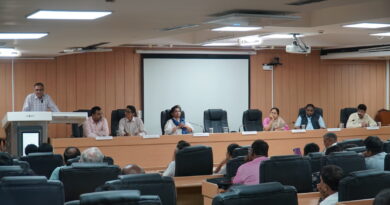Uniform Civil Code: UCC Infringes Upon Freedom of Religion Guaranteed Under Article 25 of The Indian Constitution, DMK MP P Wilson Writes To Law Commission
(Judicial Quest News Network)
Member of Rajya Sabha (DMK) P.Wilson has written a letter to the Law Commission of India questioning the re-opening of public consultation on the Uniform Civil Code issue.
He is also a Member of the Parliamentary standing Committee on Law & Justice.
He said,India’s secularism is at risk because of the UCC, wiping away the unique traditions and cultures of minorities with one personal law. This is against the basic structure of the Constitution, which contemplates preservation of India’s unique diversity.
He questioned the necessity to re-examine the matter.
21st Law Commission in 2018 had determined that UCC is not preferred.
Wilson said that Union Law Ministry had formally requested the law Commission in June2016, to examine the matters related to UCC. The 21st Law Commission dedicatedly spend two years for this task and published a consultation paper saying that implementing a Uniform Code may compromise cultural diversity and discourage people from utilising the law altogether.
Wilson who is also a senior Advocate said that further consultation means that the Commission is attempting to dilute the findings in Consultation paper dated 31.08.2018.
“When there are many issues pending consideration before the Law Commission of India, why is the Commission taking upon itself to reopen a concluded issue relating to Uniform Civil Code? To the public at large, it seems a response to the call of the ruling BJP party at the centre to implement the UCC, with one eye on the 2024 General Elections.” He said in his letter.
Before going for a new consultation plan Wilson Asked the Law Commission to provide the details of the expenditure incurred by it for consultations, meetings, publishing questionnaires, and other related activities concerning the consultation paper dated 31.082018.
What steps have been taken in accordance with the many recommendations and suggestions which are highlighted in the Consultation Paper dated 31.078.2018 by the 21st Law Commission of India? Wilson asks further.
India is a diverse nation, having religious, cultural and linguistic diversity like none other. As per a report, India is home to 398 languages, out of which 387 are actively spoken and 11 are extinct. Even within Hinduism, there are several sub-cultures, each with their own unique identity, tradition and customs. If you take one set of personal laws and apply it with brute force to all religions, sub-sects and denominations, it would destroy their uniqueness and diversity.
Wilson also highlights another crucial factor. Marriage is not just a civil union in most religions. In Christianity for example, marriage is a sacrament. It is a \v facet of religion that is why it is called the sacrament of holy matrimony. It has to be consecrated by an ordained priest, in the presence of members of the Church, in a manner specified by the Catholic Church. Therefore, if the UCC provides for marriages to be registered before an authority like Registrar, it denigrates and desecrates a holy sacrament. That apart, Christians have a practice of having marriage counselling before consecrating a marriage. A UCC will be the end of this practice. Ultimately therefore, the UCC targets religious practices and interferes with the free practice of one’s religion.
Addressing the notion that UCC as ‘pro Hindu’ Wilson argued that it could potentially damage Hindu rights and customs also. Right now, for a Hindu marriage, there need not be a registration. A marriage solemnised in a Hindu temple, by following customary practice – be it tying a thaali (in Tamil culture) or seven steps around the fire is sufficient proof of marriage. These customary marriages will no longer be recognised under a UCC, which will recognise only registered marriages before a civil authority.
So ultimately, such a code would infringe upon the freedom of religion guaranteed by Article 25 of the Indian Constitution, not just for minorities but also the majority religion. Secondly, Article 29 protects the right of minorities to preserve and protect their distinct culture. There is a legitimate fear that a uniform code would destroy the unique culture and traditions of minorities. He further said in his letter.
Civil codes can be applied to atheists or inter-religious marriages as is already the case of the Special Marriages Act, 1954.
While the idea of a Uniform Civil Code may seem appealing on the surface, it is crucial to consider the negative impact it could have on our diverse society. Preserving religious freedom, respecting cultural diversity and avoiding unintended consequences should be considered.
Instead of thrusting a uniform code, we should focus in encouraging dialogue, understanding and gradual reforms within communities through social engineering to weed out undesirable practices.
Another misconception is that the UCC is being opposed only by religious minorities. This is a classic case of misdirection, to project the UCC as a Hindu-Muslim issue. Even within the Hindu religion, certain groups like tribal groups do not want UCC. For instance, the Rashtriya Adivasi Ekta Parishad, a tribal group, approached the Supreme Court in 2016 seeking protection for their traditions and strict practices from the potential effects of a Uniform Civil Code. Tribal customs are unique and cannot be boxed in with other Hindu customs.
He further submitted that Matters such as marriage, divorce, inheritance, and property rights fall under the Concurrent List of the Constitution, which allows both the central and state governments to legislate on these subjects. However, Article 44 stipulates that a Uniform Civil Code will be applicable to “citizens throughout the territory of India”, suggesting that States may not have the power to amend it. That apart, even for subjects in the concurrent list, once a Union enacts a law, the State cannot vary such law except by the assent of the President of India. The Union will therefore have an upper hand and the UCC enacted by it will be law throughout India.
The opposition to UCC is because it desecrates the holy sacraments like marriage, which should be within the domain of religious institutions when it comes to marriage between believers. Civil codes can be applied to atheists or inter-religious marriages as is already the case of the Special Marriages Act, 1954. While the idea of a Uniform Civil Code may seem appealing on the surface, it is crucial to consider the negative impact it could have on our diverse society.
Wilson further stated that Preserving religious freedom, respecting cultural diversity and avoiding unintended consequences should be considered. Instead of thrusting a uniform code, we should focus in encouraging dialogue, understanding and gradual reforms within communities through social engineering to weed out undesirable practices.
We must draw on that experience to understand that when dealing with deep rooted religious faith, we cannot adopt a cut and dry approach but must act with compassion, understanding and patience.
Sixth schedule of the constitution deals with the provisions as to the administration of Tribal areas in the State of Assam, Meghalaya, Tripura and Mizoram. There are provisions that allow for complete autonomy on matter of family law which can be adjudicated by local panchayat, which can follow their own procedure. These are all special provisions for the people in Tribal states. Art 371 (A) to (J) and the sixth schedule of constitution of India provides certain protections to certain States of Assam, Nagaland, Mizoram Andhra Pradesh/Telangana, Arunachal Pradesh, Goa and Karnataka relating to certain protections.



